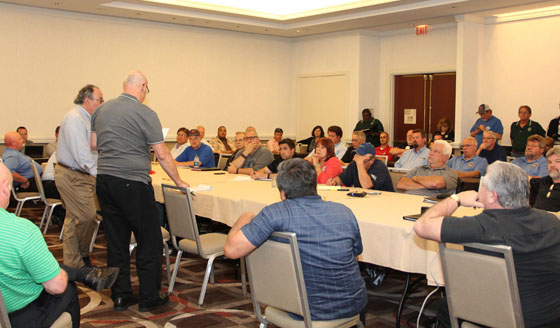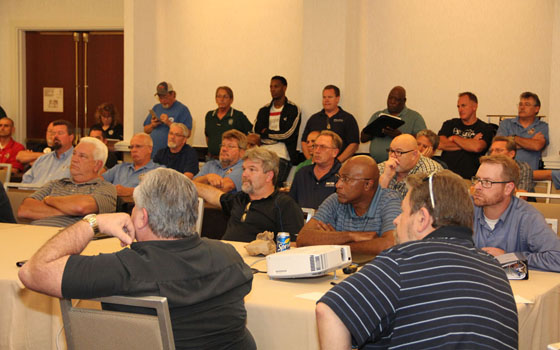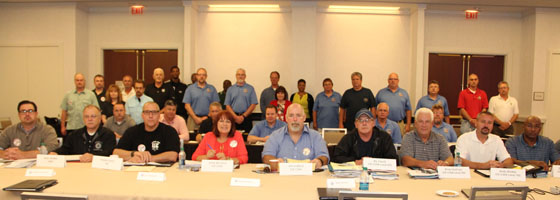Union negotiators for the Coordinated Bargaining Committee of GE Unions (CBC) met with GE Wednesday in a full-day session at the small table. The company continued presenting its initial proposals on a variety of subjects, including healthcare cost sharing, dental and vision coverage, wages, cost of living, disability, as well as some smaller issues like dependent life insurance.
During the morning session, GE introduced a series of healthcare proposals, many of which included some improvements on minor benefits. On health insurance cost sharing, GE claimed, as it had in the previous two weeks at the UE large table, that it needed to increase employee health insurance contributions to be “competitive” with other companies. GE then delivered its proposal to increase the employee cost share. UE International Rep. Gene Elk reminded the company that it had already benefited from a windfall under the current contract, when the employee percentage of health costs far exceeded the 24 percent share agreed to in 2011.
In addition to proposals on the cost share, GE offered a proposal to streamline some of the paperwork issues and problems that employees experience in getting health claims processed and paid in a timely manner. CBC bargainers asked questions about the “administrative” proposal and GE promised to respond.
UNIONS DELIVER LETTER ON POST-65 HEALTHCARE
As reported yesterday, GE proposed ending post-65 health insurance for retirees. From examples provided by GE and some of the specifics of its demand, it appeared that GE had requested bargaining to reduce health benefits for current post-65 retirees. As a result IUE-CWA President Jim Clark and UE President Bruce Klipple each sent letters to GE clarifying the position of the two unions, as well as all the CBC unions represented at the small table. President Klipple’s letter read as follows:
June 17, 2015
Mr. John Gritti
Consultant, GE Union Relations
Fairfield, CT
Dear Mr. Gritti:
GE began our 2015 negotiations by insisting that it would not bargain regarding existing retiree benefits. We were surprised yesterday to receive a proposal from GE that would substantially modify the GE health benefits now applicable to post-65 retired union members. The CBC unions will not bargain over any proposed reduction in health benefits for current retirees and we demand that GE remove from the table its bargaining proposal to reduce those benefits.
Sincerely yours,
Bruce J. Klipple
UE General President
President Klipple read the letter to GE and the company responded by indicating that it had no intention of bargaining healthcare benefits for current hourly retirees.
Also at the afternoon session, GE rolled out proposals on wages, COLA, dependent life insurance, GE educational loans, and the adoption assistance program. As you might expect, the company’s first wage proposals were completely unacceptable. Bargaining will continue at the small table at 9:00 a.m. on Thursday morning. UE was represented at the small table by General President Bruce Klipple and International Rep. Gene Elk.
SUBCOMMITTEE MEMBERS BLASTS GE RETIREE HEALTH ATTACK
In the morning session of the Pensions and Insurance Subcommittee, the company rolled out the attack on post-65 retiree health insurance, with a presentation that was apparently very close to what the CBC was given by GE at the small committee had seen on Tuesday. Before the company even began its presentation, Local 506 Business Agent Frank Fusco told them, “Those who came before us struggled to build the union. It is our intention that those workers remain covered by insurance.”
Jim Ledford of the IUE-CWA, co-chair of the subcommittee along with Fusco, rejected the concept of sending people into an exchange to shop for individual health coverage. “Our philosophy is we’re all in this together. We are all better off this way.” Ledford also noted that, while participants could not be denied coverage, they could face very high rates. “Then you go to another plan,” was the company response. Ledford said the scenarios presented by the company of infinite choice were misleading because premiums continuously go up and some of the plans being offered will fold.
Ric Cassilli of IUE-CWA Local 201 said the company saved $1.4 billion by dumping salaried retirees into a health insurance exchange, and he expected the savings from doing the same to hourly retirees would be much greater. The company expects retirees, including those who are very old, sick, and not technologically sophisticated, to shop every year for a new health plan, online or by phone. “That is ridiculous,” he declared. “We’re not going to have our members doing that.”
Frank Fusco seconded that view. “In 2011 you changed the health plan for your hourly workers. You’ve been hearing ever since that it sucks. This proposal for retirees is bad business, and no one in this room is going to accept it.” In the room were representatives of all the GE unions.
Company representatives said that the proposal to end post-65 coverage was only aimed at workers who will retire during the coming four-year contract, not current retirees, since it does not recognize the unions as representing retirees. When Fusco asked if GE plans to take company-paid insurance away from current retirees unilaterally, without bargaining, as it did to salaried retirees, company representatives would not give him a straight answer.
Gary Jordan, UAW International Representative and former-president of UAW Local 647 representing production workers at the Evendale jet engine plant, told the company negotiators that in his 36 years working for GE, “Today is the first day you have hurt my heart.” Jordan spoke emotionally about retirees who have been out for 15 years and have seen inflation eat into their pension. “What I’m seeing today is shameful. You’re emulating Walmart.” He reminded company negotiators that GE retirees are the people who built the company. “They put all of us where we are – including Immelt.”
Dave Day, an IAM Local Lodge 1916 leader from the Milwaukee plant, said, “We can help you save money many ways, but not this way.” He said, “I’ve got 36 years with this company and I’m proud of the company. But I don’t love it as much today as I did before 2011.”
Local 506 Vice President Mike Ferritto said he assumes the savings from cutting retiree healthcare are going into funding the rich supplementary pensions for GE executives. “If this puts anyone on a fixed income at risk of losing money, it’s unacceptable. Tell the person who is making these decisions it’s unacceptable.”
Janet Bernard, an IUE-CWA staff representative, described the company’s proposal as “disheartening.” You want to erode everything we’ve built in years of bargaining,” including the pension and healthcare. “Keep in mind that we have the right to walk away in 10 days.”
The company made a presentation of the impact of replacing GE health insurance with an exchange offering multiple plans, on four hypothetical retirees. Under three examples, GE’s presentation claimed that a retiree would come out even or slightly ahead on healthcare costs. The fourth hypothetical, someone with serious health issues, would be worse off financially even by the company’s calculations.
“Our philosophy is not that the sick guy pays more,” said Mike Barrell, president of the Steelworkers local at the Logan, Ohio plant. “We don’t agree with your philosophy.”
Ric Cassilli noted that the fine print on the bottom of the screen in GE’s slide presentation said that GE “reserves the right to terminate or amend” the plan it is offering.
After a lunch break, the subcommittee returned, now with nearly 40 union members after the arrival of reinforcements, an influx of additional UAW members from Evendale. The company rolled out its proposal to simplify the administration of GE Health Benefits (GEHB) with a new system that would involve just one card and no need to spend time on a website or on the phone to get medical bills paid. Union members asked many questions, and while the complexity and difficulty of self-administering health coverage is a major concern, the unions have emphasized that the excessive costs to workers are the main issue.
Later the company and unions discussed the issue of which account should pay first for the health expenses and co-pays of a worker and family – the Health Reimbursement Account (HRA) or Flexible Spending Account (FSA). The committee will continue that discussion on Thursday.
UE was represented on the Pensions and Insurance Subcommittee by Frank Fusco and Mike Ferritto, Local 506; Melvin O’Dell, Local 332; Fred Harris, Local 601; and Peter Knowlton, Northeast Region president.
NO PRIZE PACKAGE FOR CONTRACT LANGUAGE SUBCOMMITTEE
Meanwhile at the Contract Language Subcommittee, the company offered additional counter proposals on selected language issues. Some of GE’s suggestions offered slight improvements and others substantially weakened existing contract protections. After presenting several of these, the company suddenly informed the unions that these are “package deals,” with acceptance of one dependent on accepting all others. When a union attorney informed the company that introducing this new condition was probably illegal “regressive bargaining,” the company backtracked. All of a sudden, company bargainers agreed that the packaged proposals could be unpacked.
As it was on Tuesday, job security remained the hottest issue in this subcommittee, and several members hammered the company’s hypocrisy on preferential placement. Some non-union GE plants are not allowing union members with preferential hiring rights to transfer in, while displaced workers from those same non-union plants are offered placement under the program in union plants like Evendale. “You can’t have it both ways,” said Local 506 President Scott Slawson.
Apparently in response to UE proposals and discussion by representatives of Locals 506 and 332, the company offered a counter proposal on decision bargaining over transfer of production work. However the company’s proposal was even worse than the current decision bargaining provisions in the existing National Agreement.
Discussions in both subcommittees will continue on Thursday. UE was represented on the contract language subcommittee by UE Local 506 President Scott Slawson, UE Local 506 Chief Plant Steward Leo Grzegorzewski, UE Local 332 Business Agent Sherice Stark, UE Local 618 President Mike Divins, and UE Field Organizer Omar el-Malah.
Below: Late afternoon report-back meeting of all unions; Union members in Pension and Insurance Subcommittee.




